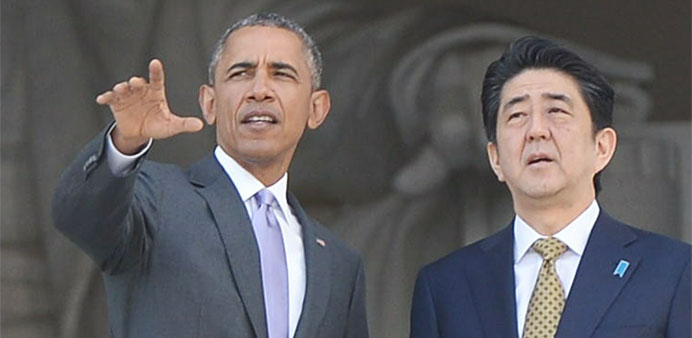AFP/Washington
President Barack Obama hosts Japan's prime minister at the White House Tuesday, hoping to hammer out a bumper Pacific trade deal and cement an alliance given new relevance by China's rise.
Obama will hold Oval Office talks with Shinzo Abe and offer a welcome normally reserved for royalty or heads of state, including a full arrival ceremony on the South Lawn and a luxurious state dinner.
On Monday Obama took Abe on an unannounced tour of the Lincoln Memorial, riding together in Obama's armoured limousine "the beast" to underscore their personal ties.
The White House is keen to capitalize on Abe's desire to put Japan back at the centre of power in Asia, as China flexes its political and economic muscle.
In the Oval Office Obama and Abe will discuss trade and are expected to hail progress toward a Trans-Pacific Partnership that brings together 12 countries -- including Japan and the United States.
The deal would cover 40 percent of the world economy.
"If we don't write the rules, China will write the rules out in that region," Obama told the Wall Street Journal ahead of the meeting.
China has increasingly been making its economic clout felt, pushing hard for the creation of an Asian Infrastructure Investment Bank to rival US-backed institutions.
Both Tokyo and the White House had hoped that Obama would have authority from Congress to clinch a deal before Abe's visit, allowing a more definitive announcement.
But political wrangling on Capitol Hill means that may not come before May.
Japan sees the authority as a prerequisite to conclude talks.
Even if progress is made, Obama has faced critics within his own party who believe the deal would allow American jobs to be shipped overseas.
Obama said the idea that he was "trying to just destroy the middle class or destroy our democracy is a little unrealistic. And they know it."
Trade negotiators are still working on tough issues linked to automobiles and agriculture. But with Obama looking for a bipartisan trade victory and Abe keen to bolster his domestic economic reforms, an eventual deal seems likely.
- A 'normal' country -
During his meeting with Abe, Obama will also seek to encourage the emergence of a more assertive Japan, which could prove a potent counterbalance to China.
On Monday the United States and Japan unveiled new rules for defense cooperation in a historic move that will give Japanese forces a wider global role and allow them to come to the defense of US assets.
While North Korea is a perennial threat, Abe has made clear his belief that China is destabilizing the region via its assertive claims to territory at sea.
Japan's military was scrapped after the end of World War II, and pacifism is enshrined in the country's constitution, which Abe has sought to reinterpret.
A more robust foreign policy from Japan could fit nicely with Obama's "pivot to Asia," a strategy of aggressively nurturing a network of alliances in the region.
But Japan's past and Abe's attitudes towards it could scupper a united front that is able to resist China's centripetal pull.
Tokyo's relationship with US ally South Korea has been tainted by Abe's alleged efforts to minimize Japan's own atrocities during World War II, particularly the forced sexual enslavement of up to 200,000 "comfort women" from Korea and China.
With the 70th anniversary of war at hand, South Korea has called for Abe to repeat the apologies of his predecessors, something he has so far been reluctant to do.
"My heart aches when I think about the people who were victimized by human trafficking and who were subject to immeasurable pain and suffering beyond description," he said Monday in Boston.
"On this score my feeling is no different from my predecessor prime ministers."
On Monday Abe also visited Arlington National Cemetery -- laying a wreath at the Tomb of the Unknown Soldier -- and the Holocaust Memorial Museum, both symbolic gestures that hint at contrition.
On Wednesday Abe will become the first Japanese prime minister to address a joint session of the US Congress, where sympathy for South Korea's demands runs high.
But there, contrition may not be enough.
"What and how he comments about World War II will be closely watched," said Shihoko Goto, an analyst at the Wilson Center. "What Washington needs is a Japan that it can rely on and a respected leader in Asia."
Goto added: "The success of Abe's visit will be measured in part by how and whether he can turn the tide of public opinion. Can he project a Japan that is empathetic? Soft power will matter as much as securing military and trade partnerships in this visit."

